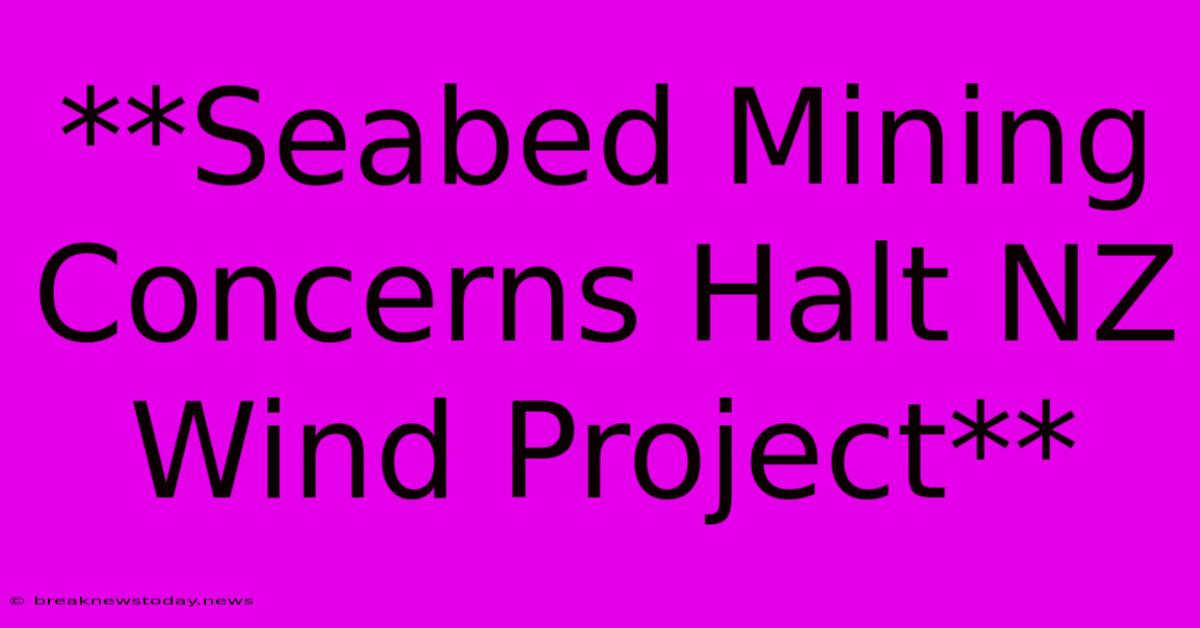**Seabed Mining Concerns Halt NZ Wind Project**

Discover more detailed and exciting information on our website. Click the link below to start your adventure: Visit Best Website naughtynakes.com. Don't miss out!
Table of Contents
Seabed Mining Concerns Halt NZ Wind Project: A Blow to Green Energy Ambitions
The ambitious New Zealand wind farm project, "Project Nui", has been put on hold due to growing concerns about the potential environmental impact of seabed mining. This decision highlights the complex and often conflicting nature of achieving environmental sustainability and securing crucial energy resources.
A Project of Promise
Project Nui, envisioned as a massive offshore wind farm in the Manukau Harbour region, was intended to significantly contribute to New Zealand's goal of achieving 100% renewable energy by 2035. With a projected capacity of up to 1.5 gigawatts, the project promised to power thousands of homes while reducing the country's reliance on fossil fuels.
Seabed Mining: A Controversial Undertaking
However, the proposed project faced strong opposition from environmental groups and local communities concerned about the potential impact of seabed mining. The planned wind farm would have required the extraction of iron sands from the seabed to build the necessary infrastructure. This process raised alarm bells regarding potential disruption to marine ecosystems, habitat destruction, and sediment plumes that could negatively impact water quality and marine life.
Environmental Concerns Take Center Stage
The Ministry for the Environment (MfE), responsible for granting permits for such projects, acknowledged the "significant environmental risks" associated with seabed mining. This led to a thorough review process, ultimately resulting in the project being put on hold until further research and mitigation measures are explored.
A Setback for Green Energy
The halting of Project Nui represents a setback for New Zealand's ambitions in renewable energy. While the country remains committed to transitioning away from fossil fuels, this decision highlights the importance of balancing environmental concerns with energy needs.
Looking Ahead: Finding Sustainable Solutions
This situation calls for innovative solutions that can navigate the complexities of renewable energy development while protecting the environment. Further research into minimizing the environmental impact of seabed mining, alternative construction materials, and more environmentally friendly offshore wind farm designs are crucial steps towards achieving sustainable energy solutions.
The future of Project Nui remains uncertain, but this situation serves as a valuable lesson in the importance of thorough environmental impact assessments and community engagement in the development of major infrastructure projects. As we strive for a greener future, finding solutions that balance environmental protection with energy needs will be crucial for achieving our sustainability goals.

Thank you for visiting our website wich cover about **Seabed Mining Concerns Halt NZ Wind Project**. We hope the information provided has been useful to you. Feel free to contact us if you have any questions or need further assistance. See you next time and dont miss to bookmark.
Featured Posts
-
Blue Tents Deemed Eyesore Port Dickson Council Warns
Oct 28, 2024
-
Dr Caliskan 29 Ekim I Anlatti
Oct 28, 2024
-
Chelsea Vs Newcastle Vorschau And Wettquoten Am 27 10
Oct 28, 2024
-
Diretta Chelsea Newcastle Canali Tv E Streaming
Oct 28, 2024
-
A A A Y A A Y A A A Y Ea A Y A A A A A A A A A A A A A A A Ye A Ya A A Y A A A Ye A A Y A A Y A A A A A A A A A A A A Y A A Y A A A A A Ye A A A A Y A A A Y A A A A Y A A Y A A Y A A A Ye A A A Y A A A Y A A A A A A Y A A A A Y A A Y A A A A A Ye A A A A Y A A A Y A A A A Y A A Y A A Y A A A Ye A A A Y A A A Y A A A A A A Y A A A A Y A A Y A A A A A Ye A A A A Y A A A Y A A A A Y A A Y A A Y A A A Ye A A A Y A A A Y A A A A A A Y A A A A Y A A Y
Oct 28, 2024
